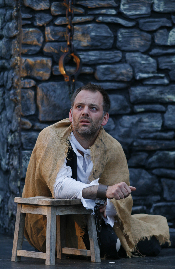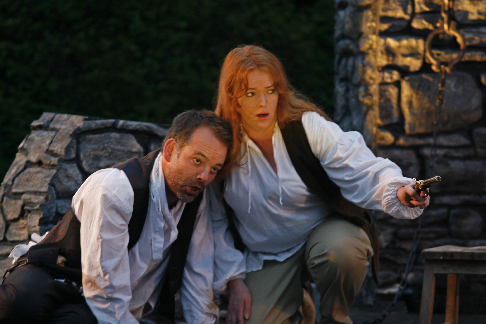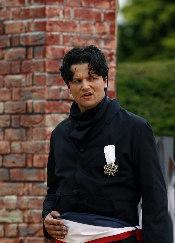![Emily Rowley Jones (Marcellina) and Samuel Evans (Giacchino) [Photo © Jeremy Gray]](http://www.operatoday.com/Paer_Leonora1.png)
22 Sep 2008
Paer’s Leonora from Bampton Classical Opera
Musically and dramatically Ferdinando Paer’s Leonora and Beethoven’s Fidelio might be said to belong respectively to pre- and post-revolutionary ages.
English Touring Opera are delighted to announce a season of lyric monodramas to tour nationally from October to December. The season features music for solo singer and piano by Argento, Britten, Tippett and Shostakovich with a bold and inventive approach to making opera during social distancing.
This tenth of ten Live from London concerts was in fact a recorded live performance from California. It was no less enjoyable for that, and it was also uplifting to learn that this wasn’t in fact the ‘last’ LfL event that we will be able to enjoy, courtesy of VOCES8 and their fellow vocal ensembles (more below …).
Ever since Wigmore Hall announced their superb series of autumn concerts, all streamed live and available free of charge, I’d been looking forward to this song recital by Ian Bostridge and Imogen Cooper.
Although Stile Antico’s programme article for their Live from London recital introduced their selection from the many treasures of the English Renaissance in the context of the theological debates and upheavals of the Tudor and Elizabethan years, their performance was more evocative of private chamber music than of public liturgy.
Evidently, face masks don’t stifle appreciative “Bravo!”s. And, reducing audience numbers doesn’t lower the volume of such acclamations. For, the audience at Wigmore Hall gave soprano Elizabeth Llewellyn and pianist Simon Lepper a greatly deserved warm reception and hearty response following this lunchtime recital of late-Romantic song.
For this week’s Live from London vocal recital we moved from the home of VOCES8, St Anne and St Agnes in the City of London, to Kings Place, where The Sixteen - who have been associate artists at the venue for some time - presented a programme of music and words bound together by the theme of ‘reflection’.
'Such is your divine Disposation that both you excellently understand, and royally entertaine the Exercise of Musicke.’
‘And there was war in heaven: Michael and his angels fought against the dragon; and the dragon fought and his angels, And prevailed not; neither was their place found any more in heaven … that old serpent … Satan, which deceiveth the whole world: he was cast out into the earth, and his angels were cast out with him.’
There was never any doubt that the fifth of the twelve Met Stars Live in Concert broadcasts was going to be a palpably intense and vivid event, as well as a musically stunning and theatrically enervating experience.
‘Love’ was the theme for this Live from London performance by Apollo5. Given the complexity and diversity of that human emotion, and Apollo5’s reputation for versatility and diverse repertoire, ranging from Renaissance choral music to jazz, from contemporary classical works to popular song, it was no surprise that their programme spanned 500 years and several musical styles.
The Academy of St Martin in the Fields have titled their autumn series of eight concerts - which are taking place at 5pm and 7.30pm on two Saturdays each month at their home venue in Trafalgar Square, and being filmed for streaming the following Thursday - ‘re:connect’.
The London Symphony Orchestra opened their Autumn 2020 season with a homage to Oliver Knussen, who died at the age of 66 in July 2018. The programme traced a national musical lineage through the twentieth century, from Britten to Knussen, on to Mark-Anthony Turnage, and entwining the LSO and Rattle too.
With the Live from London digital vocal festival entering the second half of the series, the festival’s host, VOCES8, returned to their home at St Annes and St Agnes in the City of London to present a sequence of ‘Choral Dances’ - vocal music inspired by dance, embracing diverse genres from the Renaissance madrigal to swing jazz.
Just a few unison string wriggles from the opening of Mozart’s overture to Le nozze di Figaro are enough to make any opera-lover perch on the edge of their seat, in excited anticipation of the drama in music to come, so there could be no other curtain-raiser for this Gala Concert at the Royal Opera House, the latest instalment from ‘their House’ to ‘our houses’.
"Before the ending of the day, creator of all things, we pray that, with your accustomed mercy, you may watch over us."
The doors at The Metropolitan Opera will not open to live audiences until 2021 at the earliest, and the likelihood of normal operatic life resuming in cities around the world looks but a distant dream at present. But, while we may not be invited from our homes into the opera house for some time yet, with its free daily screenings of past productions and its pay-per-view Met Stars Live in Concert series, the Met continues to bring opera into our homes.
Music-making at this year’s Grange Festival Opera may have fallen silent in June and July, but the country house and extensive grounds of The Grange provided an ideal setting for a weekend of twelve specially conceived ‘promenade’ performances encompassing music and dance.
There’s a “slide of harmony” and “all the bones leave your body at that moment and you collapse to the floor, it’s so extraordinary.”
“Music for a while, shall all your cares beguile.”
The hum of bees rising from myriad scented blooms; gentle strains of birdsong; the cheerful chatter of picnickers beside a still lake; decorous thwacks of leather on willow; song and music floating through the warm evening air.
![Emily Rowley Jones (Marcellina) and Samuel Evans (Giacchino) [Photo © Jeremy Gray]](http://www.operatoday.com/Paer_Leonora1.png)
Musically and dramatically Ferdinando Paer’s Leonora and Beethoven’s Fidelio might be said to belong respectively to pre- and post-revolutionary ages.
Based, like its more well-known successor, upon Jean Nicolas Bouilly’s play Léonore, ou L’amour conjugal, Paer’s opera has many textual similarities with Beethoven’s drama of heroic rescue and noble sentiments. The faithful wife who disguises herself as a boy in order to reach and rescue her unjustly imprisoned husband forms the core of both works; yet, in Paer’s opera it is not Leonora but the flighty daughter of the jailor who actually releases him from bondage. Indeed, from the light-weight dalliances of the opening moments to the exuberant, self-satisfied moralising of the final sextet (echoes of Don Giovanni or Così?), Paer reveals himself to be more comfortable with the world of petty intrigue and human foibles than with the exalted idealism of Beethoven’s utopian aspirations.
 Michael Bracegirdle as Florestano [Photo © Anthony Hall]
Michael Bracegirdle as Florestano [Photo © Anthony Hall]
That said, this imaginative, focused production by Bampton Classical Opera, directed and designed by Jeremy Gray — and first presented under
gloomy summer skies at Bampton Deanery on 18 July — made a strong case,
both musically and dramatically, for this infrequently performed work. Act 2,
in particular, revealed serious musical and dramatic intent, the dramatic
momentum of the recitative and the emotional intensity of Florestan’s long
opening aria of darkness and suffering, proving surprisingly progressive.
Paer makes little distinction between the music of the two female roles, Marcellina and Leonora/Fidele; both are high sopranos, but the star on this occasion was Emily Rowley Jones, who expertly conveyed the spirited passion, tempered by an essential kindness and innocence, of the jailor’s daughter. Rowley Jones possessed the stamina required of this demanding role, and her voice remained well-centred and sweet throughout; virtuosic flourishes were dispatched with apparent ease, and intelligently nuanced to serve the dramatic situation. She brought Mozartian grace and wit to the opening scenes; her movements on the small stage were well-choreographed and deftly executed. It was through the dynamic contrast between Marcellina’s unrequited passion for ‘Fidele’ and her impatient dismissal of Giacchino’s courtship that the drama gained vitality.
Both female roles demand a wide range and much staying power — Marcellina requires the compass of a Queen of the Night; in the title role, Cara McHardy initially seemed ill-at-ease, her breath control a little insecure and the more virtuosic passages not always firmly controlled. However, as the performance progresses she showed herself on occasion more than capable of rising to the challenges of the taxing coloratura and bringing both meaning and beauty to her interpretation. Unfortunately her lack of confidence dramatically was noticeable in the ensembles where she appeared uncomfortable and at times vocally subdued.
 Michael Bracegirdle as Florestano, Cara McHardy as Leonora [Photo © Anthony Hall]
Michael Bracegirdle as Florestano, Cara McHardy as Leonora [Photo © Anthony Hall]
As in previous Bampton productions, Adrian Powter, as Rocco, revealed his instinct for the dramatic moment, moving confidently and establishing a strong stage presence. He injected appropriate weight and bluff into his boasting tirades, which benefited also from excellent diction. Samuel Evans, as the hapless prison janitor, Giacchino, similarly demonstrated sound comic timing and nuance, and together they significantly contributed to the dramatic momentum, which might have been hampered by the many long reflective arias and by the extensive duet for Marcellina and Leonora in Act 2.
The challenges of the twenty-minute aria for Florestan which opens Act 2 are many; but Michael Bracegirdle proved himself able to shape the various sections of his painful, desolate lament on his lengthy suffering in the darkness into a convincing whole, employing an extensive dynamic range and sensitive tonal variations.
 Jonathan Stoughton as Pizzarro [Photo © Anthony Hall]
Jonathan Stoughton as Pizzarro [Photo © Anthony Hall]
Despite the foreboding guillotine and imposing dungeon walls which
dominated the set, it was difficult for the cast to inject any real menace
into Paer’s drama. There is no prisoner’s chorus to emphasise the themes
of imprisonment and despair; and Pizarro, the prison governor, is a rather
unconvincing stage-villain — his comic arrogance emphasised here by his
Napoleonic cape and eye-patch. His bluster may be less than threatening, but
Jonathan Stoughton sang securely if a little blandly. It was not
Stoughton’s fault that, following a rather feeble confrontation with
Leonora, Pizarro found himself cast in chains, and one immediately forgot
about him. Indeed, there is a deflation of dramatic tension towards the close
of Act 2: the arrival of Marcellina, demanding a marriage proposal from
‘Fedele’ somewhat dispels the threat of violence, and the arrival of Don
Fernando, sung here with warm radiance by John Upperton, swiftly and
effortlessly restores harmony and accord.
However, Paer’s opera does have many notable features, not least its strong melodic character. This is evident from the first bars of the overture, a seemingly simple medley of forthcoming themes, which has an original feature in the heroine’s romantic ‘motto’ theme, heard three times here and subsequently reiterated most effectively at crucial points in the action. Throughout the orchestration surprises and delights: while the rather clichéd trumpet call introducing the sinister dungeon setting and the three percussive chimes announcing the hour of Florestan’s murder may fail to send a shiver up the spine, overall the writing revealed some striking colours, exploiting unusual instrumental combinations, especially for the woodwind. The score was well-executed by the London Mozart Players. Situated behind the imposing set, conductor Robin Newton led them in lively fashion; indeed, he set off at a pace which left the singers somewhat trailing in the orchestra’s wake, anxiously glancing at the distantly-placed monitors; but secure ensemble was quickly restored and the overall balance between soloists and orchestra was well-judged.
Paer’s Leonora is an excellent example of its genre — a semi-seria opera, in which the frivolous and tragic co-exist and interact. It may be that the comic plot slightly overshadows the high drama of wrongful imprisonment and tyranny, but this intelligent, well-paced production by Bampton Classical Opera made a convincing case for the composer’s melodic lyricism and left this listener eager for another opportunity to hear this unfairly neglected work.
Claire Seymour